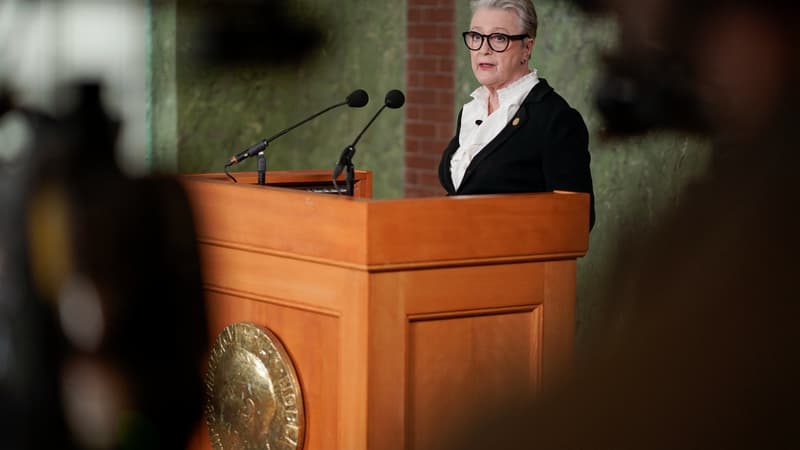A strong and highly symbolic position. This Friday, the Nobel Peace Prize was awarded to a trio of representatives from Eastern European civil societies, the Belarusian activist Ales Beliatski, the Russian NGO Memorial and the Ukrainian Center for Civil Liberties.
“The Norwegian Nobel Committee wishes to honor three outstanding champions of human rights, democracy and peaceful coexistence in the three neighboring countries, Belarus, Russia and Ukraine,” said its chairman Berit Reiss-Andersen. In these times of Ukrainian conflict, this election is all the more important as it is unprecedented.
“In 1917 or 1944, it had been attributed to the Red Cross Committee, so as not to take a position. This is the first time we have taken such a strong position,” says Patrick Sauce, a journalist specializing in international politics at BFMTV.
Memorial and the “weak signal”
Between the lines of this reward, there seems to be a desire to reward the opposition to the Russian president. “It is a direct message to Vladimir Putin,” explains Nadezda Kutepova, a Russian political refugee, a member of the Russia-Libertas association.
This criticism is particularly noticeable through the election of Memorial, this Russian NGO dissolved at the end of 2021 and whose mission was to shed light on the Stalinist purges, then the repressions in contemporary Russia of Vladimir Putin.
Last winter, the Russian justice had pronounced the dissolution of Memorial for violations of a controversial law on “foreign agents”, a decision that shocked both the West and Russia and unleashed an avalanche of condemnations. It had preceded the start of the invasion in Ukraine by only a few weeks.
“His performance is fundamental in a country where Putin wants to rewrite history. The dissolution of it was a weak signal that we did not know how to interpret in the Kremlin’s narrative to lead to the special military operation of February 24, it had to cut ‘the weeds’ “, analyzes General Jérôme Pellistrandi, defense consultant for BFMTV .
At the same time, Memorial compiled a list of political prisoners, provided assistance to them, as well as to migrants and sexual minorities.
“The Honor of Democracy”
The choice to award the activist Ales Beliatski is not trivial either. This Belarusian, currently imprisoned in this dictatorship that has become a vassal state of Russia, has been for decades the face of the defense of rights in an increasingly authoritarian country. In power, Alexander Lukashenko, close to the Kremlin, is one of the last leaders to support Russia in the Ukrainian conflict.
The founder of the organization Viasna (“Spring”), 60, was arrested for “tax evasion”, a case perceived as revenge by the current president, in power since 1994 and who gags any form of criticism with blows. canes, from the vast post-election protest movement of the summer of 2020 that rocked his regime. Berit Reiss-Andersen immediately called on the regime to release the lawyer.
This is not Ales Beliatski’s first time in prison or his first wave of repression. His previous imprisonment, for nearly three years from 2011 to 2014, had also been orchestrated for tax purposes. His arrest came a few months after presidential elections that had already led to severely repressed opposition demonstrations.
“These NGOs, this lawyer, are the honor of democracy against two totalitarian regimes. This also reflects, and is not insignificant, the concern about Putin’s imperialist vision of the Great Russia discourse. It is support for other forms of combat, that of human rights”, underlines General Pellistrandi.
call the resistance
“For the Ukrainian NGO, it echoes what is currently happening there”, Patrick Sauce still abounds, while Ukraine has been torn apart for more than seven months by the conflict that opposes it to Moscow. On Friday at noon, the Ukrainian Center for Civil Liberties was also delighted with this award.
“We are happy,” replied one of the NGO leaders, Olexandra Romantsova, while adding that she still had “a lot of work to do for victory.” She announced a press conference for Saturday and specified that she was going to Ukraine with the head of the organization, Olexandra Matviïtchouk.
Beyond criticism of Vladimir Putin, this triple attribution is also a call to resist the attention of civil society in these three countries.
“The important thing is to support the completely eliminated civil society in these three countries, the horizontal networks of people coming together,” concludes Nadezda Kutepova, a Russian political refugee, a member of the Russia-Libertas association and also close to the founders of Memorial. . .
Source: BFM TV


